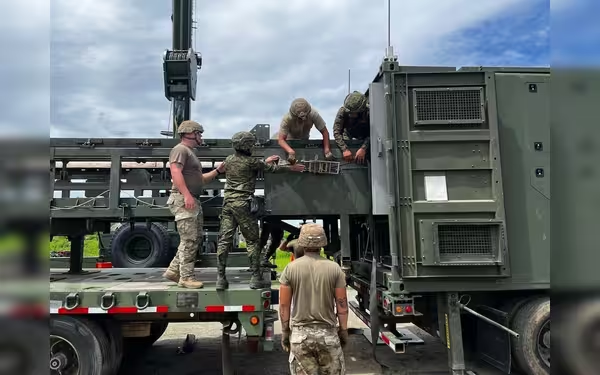Sunday, October 6, 2024 12:36 AM
Philippines Hosts Typhon Missile Systems Amid Rising Tensions with China
- Philippines deploys Typhon missiles, escalating tensions with China.
- Military chief suggests missiles may remain 'forever' in the Philippines.
- China warns of regional arms race due to US-Philippines military exercises.
 Image Credits: asiatimes
Image Credits: asiatimesThe Philippines hosts Typhon missile systems, escalating tensions with China amid military maneuvers and warnings of an arms race.
In recent weeks, tensions in the South China Sea have escalated significantly as the Philippines and China engage in a series of military maneuvers. This situation has become increasingly complex, particularly with the Philippines' decision to host the advanced Typhon missile systems from the United States. This move is reminiscent of the Cuban missile crisis, a historical event that brought the world to the brink of nuclear war. The Typhon missile system, a mid-range weapon capable of striking targets over 1,600 kilometers away, could play a crucial role in any potential conflict involving China, especially concerning Taiwan.
The Philippine government has made it clear that it intends to keep these missile systems on its territory for the foreseeable future. Military chief Romeo Brawner even suggested that they might remain “forever.” This statement has raised eyebrows and sparked concerns in Beijing, where officials have expressed strong opposition to the deployment. A senior Filipino official went so far as to say that the goal is to give China “sleepless nights,” highlighting the seriousness of the situation.
The Typhon saga began earlier this year during the annual Balikatan exercises, which are the largest joint military drills between the Philippines and the United States. The Pentagon's decision to deploy the Typhon missile system was framed as a significant step in strengthening the partnership between the two nations. However, when China criticized this deployment, both American and Filipino officials attempted to downplay its importance, labeling it as a logistical exercise rather than a provocative military action.
In July, Chinese Foreign Minister Wang Yi issued a stern warning regarding the situation, accusing Manila and Washington of instigating a regional arms race. This accusation reflects the growing unease in the region as countries navigate the complex dynamics of military power and territorial disputes.
As the Philippines and China continue to engage in these military exercises, the implications for regional stability are profound. The presence of the Typhon missile systems could alter the balance of power in the South China Sea, leading to increased tensions not only between these two nations but also involving other regional players. It is essential for all parties to approach this situation with caution and a commitment to dialogue, as the stakes are incredibly high. The world is watching closely, and the actions taken in the coming weeks and months will undoubtedly shape the future of security in the Asia-Pacific region.













